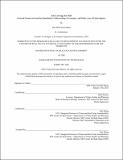ESG Leverage for TOD. General Framework and the Quantitative Underwriting, Governance, and Policy case of Union Square
Author(s)
Huicochea Mason, Juan
DownloadThesis PDF (9.120Mb)
Advisor
Duarte, Fabio
Zheng, Siqi
Terms of use
Metadata
Show full item recordAbstract
There is a global need for over 6 trillion in annual infrastructure commitment to achieve the UN and COP 21 sustainable goals by 2050, representing a burden of 50-75% delta over current budgetary trends. Despite a notorious increase in capital, there is a lack of "bankable projects" to invest in. In contrast, recent years have witnessed an increasing demand for ESG; this appears as an opportunity to develop more sustainable projects.
The first part of this work aims to help developers, public officials, and planners with a universal framework to leverage ESG mechanisms over the project finance and funding structures, focusing on Transit Oriented Development as a case that can contribute to closing the current sustainability crisis gap both from the infrastructure and the real estate side.
The second part of this work is focused in a case using the framework previously depicted; the case of Union Square in Sommerville, within the Boston Metropolitan Area. Given a real 2.4 million sqft development project, the analysis considers the project as-it-is under the undergoing policy and market framework. Focusing specifically on the environmental side of the project, the analysis considers the green benefits and construction costs (greeniums) of the certified project, together with its CO2 offsets and capital costs discounts. Then the analysis evolves in two recommended policies given the specificity of Somerville context: density bonuses and entitlement expeditiousness. The accountability of the revenues, policy analysis, and a public-private partnership will affect the project's financial performance in a methodic way.
The input variables will be assessed under pessimistic, fair and optimistic scenarios and will shed light on which variable and policy deserves more attention regarding its elastic impact on key financial indexes. Following this structure, a context-specific policy and green development strategy can be drawn to foster TOD developments in the Boston area.
Date issued
2023-02Department
Massachusetts Institute of Technology. Center for Real Estate. Program in Real Estate Development.Publisher
Massachusetts Institute of Technology